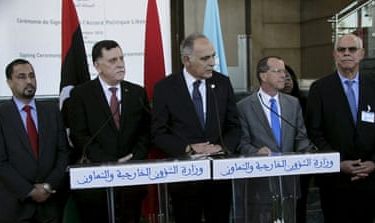Libya’s Presidential Council names new unity government
Council names a list of 18 ministers which the internationally recognised parliament will vote on this week.

Libya’s UN-backed Presidential Council announced the formation of a revised national unity government, with the internationally recognised parliament to vote on the line-up early this week.
One of the council’s members, Fathi al-Majbari, said in a televised statement late on Sunday that the list of 13 ministers and five ministers of state had been sent to Libya’s eastern parliament for approval.
Majbari, announced the list just before the deadline to reach an agreement expired.
“We hope that this will be the beginning of the end of the conflict in Libya,” Majbari said from Skhirat, Morocco, where the council has been meeting to try to come up with a government.
But in a sign of continuing divisions over how to bring together Libya’s warring factions, two of the council’s nine members refused for a second time to put their signatures to the proposed government, according to a document posted on the Presidential Council’s Facebook page.
The United Nations plan under which the unity government has been named was designed to help Libya stabilise and tackle a growing threat from the Islamic State of Iraq and the Levant (ISIL). It was signed in Morocco in December, but has been opposed by hardliners on both sides from the start and suffered repeated delays.
The council that reached the agreement is made up of nine members from Libya’s rival factions and headed by Fayez al-Sarraj, the prime minister-designate.
‘Journey to peace’
Sarraj, who also heads the Presidential Council, told reporters on Sunday that the latest appointments took into account “experience, competence, geographical distribution, the political spectrum and the components of Libyan society”.
Many of the names on Sunday’s list were different from last month’s proposal, though the nominee for the key post of defence minister, Mahdi al-Barghathi, was unchanged.
UN Libya envoy Martin Kobler was quick to congratulate the council on announcing a new cabinet. “The journey to peace and unity of the Libyan people has finally started,” he tweeted.
Anas El Gomati, a political analyst and founder of the Tripoli-based Sadeq Institute, said the latest agreement might not bring peace to Libya.
![Libya has been in chaos since the 2011 fall of long-time ruler Muammar Gaddafi[Reuters]](/wp-content/uploads/2016/02/2874d976cec744c49970a32d2ecce2de_18.jpeg)
“I’m quiet pessimistic about this new development. The majority of what’s fueling the civil war in Libya has been hidden behind the rhetoric around the ‘war on terror’, about saving the revolution but in fact most of the strategic fighting on the ground has been about resources: financial, military and other infrastructural resources around the country,” El Gomati told Al Jazeera.
“The discussions have not focused anything more than bringing people to the table. So, we have got a peace government but we haven’t got a peace deal,” El Gomati said.
Libya has been in chaos since the 2011 fall of long-time ruler Muammar Gaddafi, with two rival administrations and armed groups fighting for control of the oil-rich country.
A rebel alliance overran Tripoli in August 2014, establishing its own government and parliament and causing the recognised administration to flee to the country’s remote east.